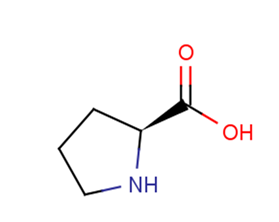
proline
CAS No. 147-85-3
proline( Proline | CB 1707 | FEMA No. 3319 | HSDB 1210 )
Catalog No. M18044 CAS No. 147-85-3
Proline and its derivatives are often used as asymmetric catalysts in organic reactions, as the CBS reduction and proline catalysed aldol condensation.
Purity : >98% (HPLC)
 COA
COA
 Datasheet
Datasheet
 HNMR
HNMR
 HPLC
HPLC
 MSDS
MSDS
 Handing Instructions
Handing Instructions
| Size | Price / USD | Stock | Quantity |
| 500MG | 38 | In Stock |


|
| 1G | Get Quote | In Stock |


|
Biological Information
-
Product Nameproline
-
NoteResearch use only, not for human use.
-
Brief DescriptionProline and its derivatives are often used as asymmetric catalysts in organic reactions, as the CBS reduction and proline catalysed aldol condensation.
-
DescriptionProline is a non-essential amino acid that is synthesized from GLUTAMIC ACID. It is an essential component of COLLAGEN and is important for proper functioning of joints and tendons.
-
In Vitro——
-
In Vivo——
-
SynonymsProline | CB 1707 | FEMA No. 3319 | HSDB 1210
-
PathwayOthers
-
TargetOther Targets
-
RecptorOthers
-
Research Area——
-
Indication——
Chemical Information
-
CAS Number147-85-3
-
Formula Weight115.13
-
Molecular FormulaC5H9NO2
-
Purity>98% (HPLC)
-
SolubilityH2O : 50 mg/mL 434.29 mM;
-
SMILESC1CC(NC1)C(=O)O
-
Chemical NameL-proline
Shipping & Storage Information
-
Storage(-20℃)
-
ShippingWith Ice Pack
-
Stability≥ 2 years
Reference
molnova catalog



related products
-
Talacotuzumab
Talacotuzumab (JNJ 56022473) is an IgG1 fully humanized CD123 neutralizing monoclonal antibody containing a modified Fc structure.
-
BC-1258
BC-1258 is a unique small molecule F-box/LRR-repeat protein 2 (FBXL2) activator.
-
Angiotensin II (1-4)...
Angiotensin II is a potent direct vasoconstrictor, causing arteries and veins to constrict, so leading to an increase in blood pressure.



 Cart
Cart
 sales@molnova.com
sales@molnova.com


